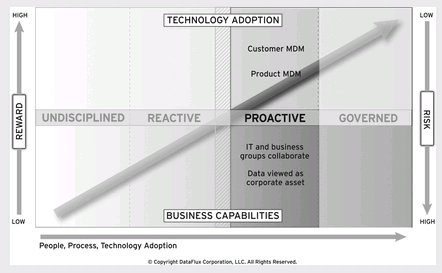CHAPTER 8
Proactive Organizations: Reducing Risk, Avoiding Uncertainty
Proactive people aren’t pushy. They’re smart, they’re value driven, they read reality, they know what’s needed.
—STEPHEN R. COVEY, THE SEVEN HABITS OF HIGHLY EFFECTIVE PEOPLE
EXECUTIVE OVERVIEW
Characteristics of a Proactive Organization
• Think globally, act collectively
• Mastered use of enterprise resource planning (ERP), customer relationship management (CRM), and data warehouse technology
• Executives who view data as a strategic asset
Technology Adoption
• Customer master data management (MDM)
• Product MDM
• Employing enterprise-wide data definitions and business rules
• Enabling service-oriented architecture (SOA) architecture for cross-organization data consistency
Business Capabilities
• IT and business groups collaborate
• Enterprise view of certain domains
• Data viewed as a corporate asset
REMEMBER
1. Data quality and data governance should never be considered a one-time project. A quality culture must be established as an ongoing, continuous process.
2. No organization can tackle enterprise-wide data quality and data governance all at once. To be successful, your journey must be evolutionary. Start small and take achievable steps that can be measured along the way.
In the proactive organization, data is treated as a corporate asset. This means that it is appropriately funded, sufficiently staffed, and has ...


